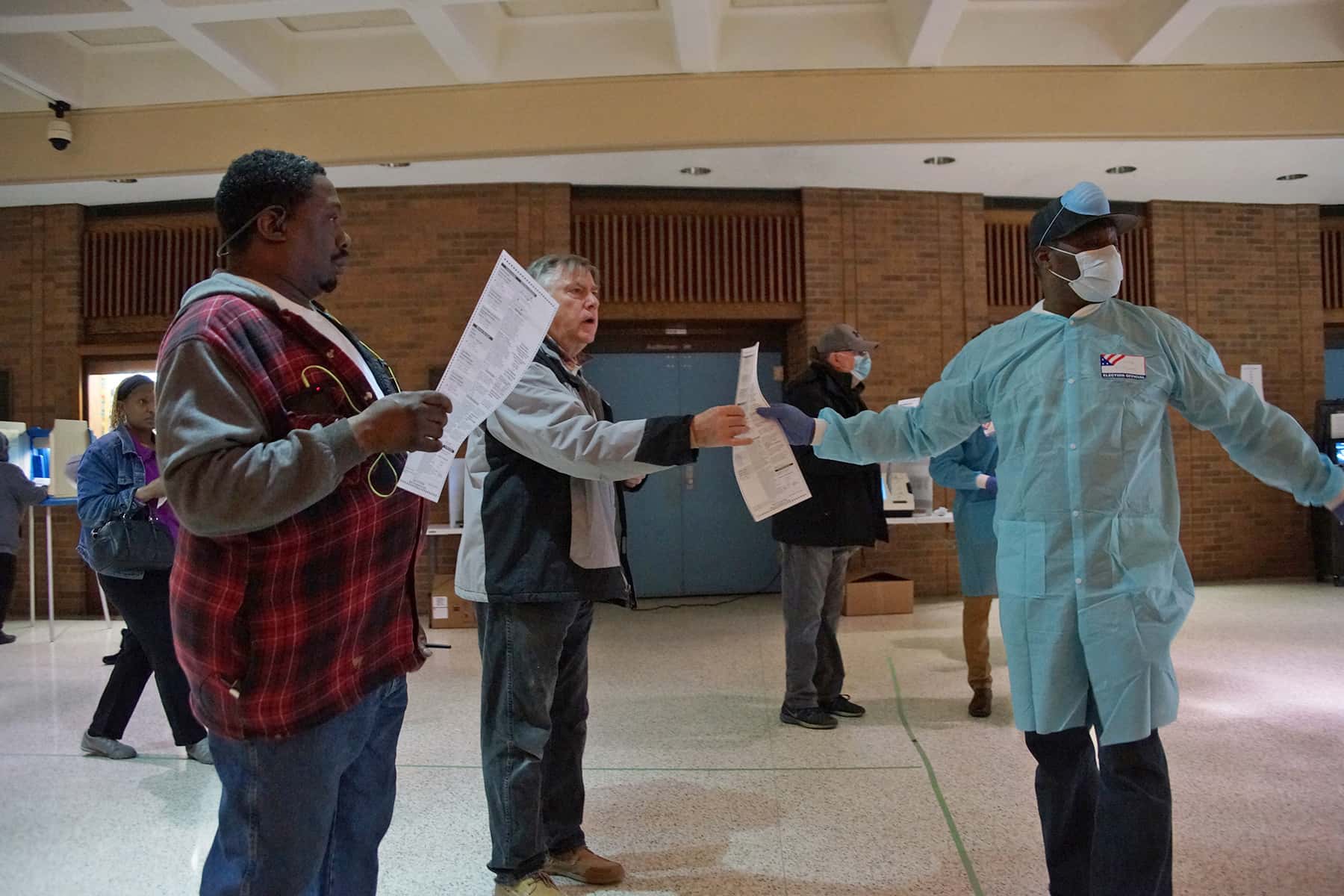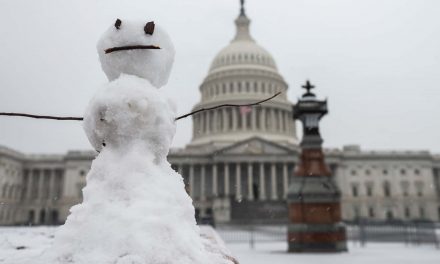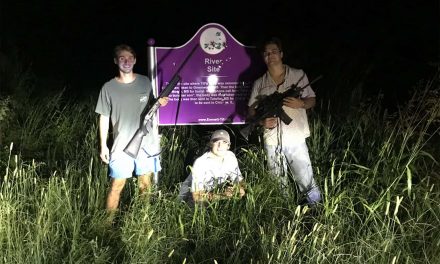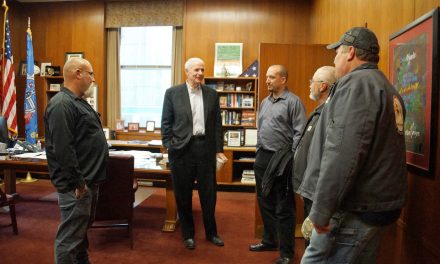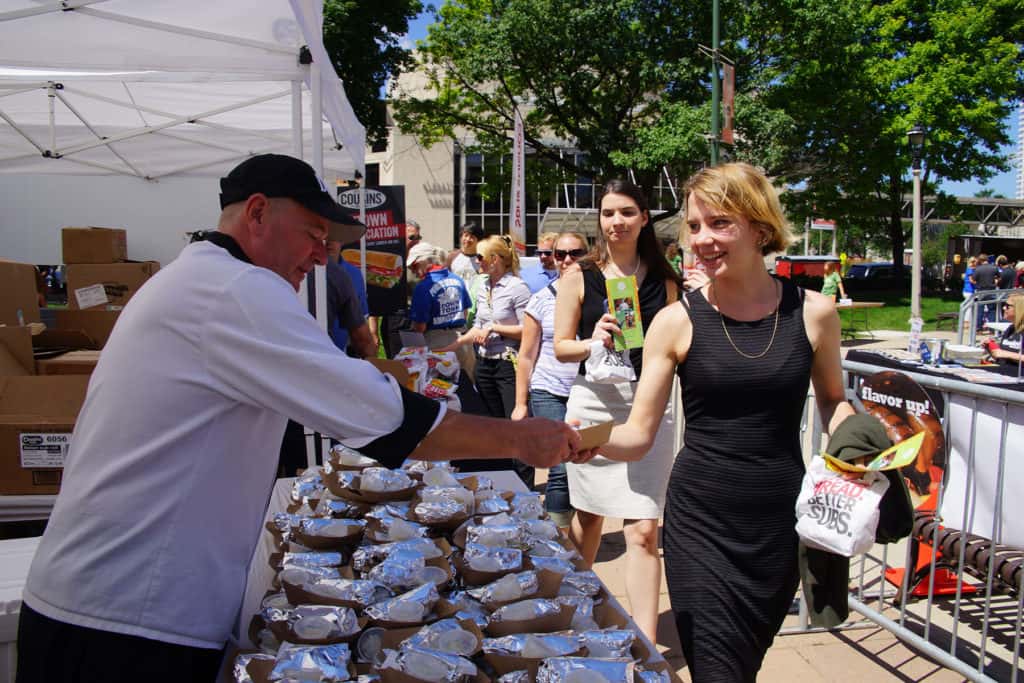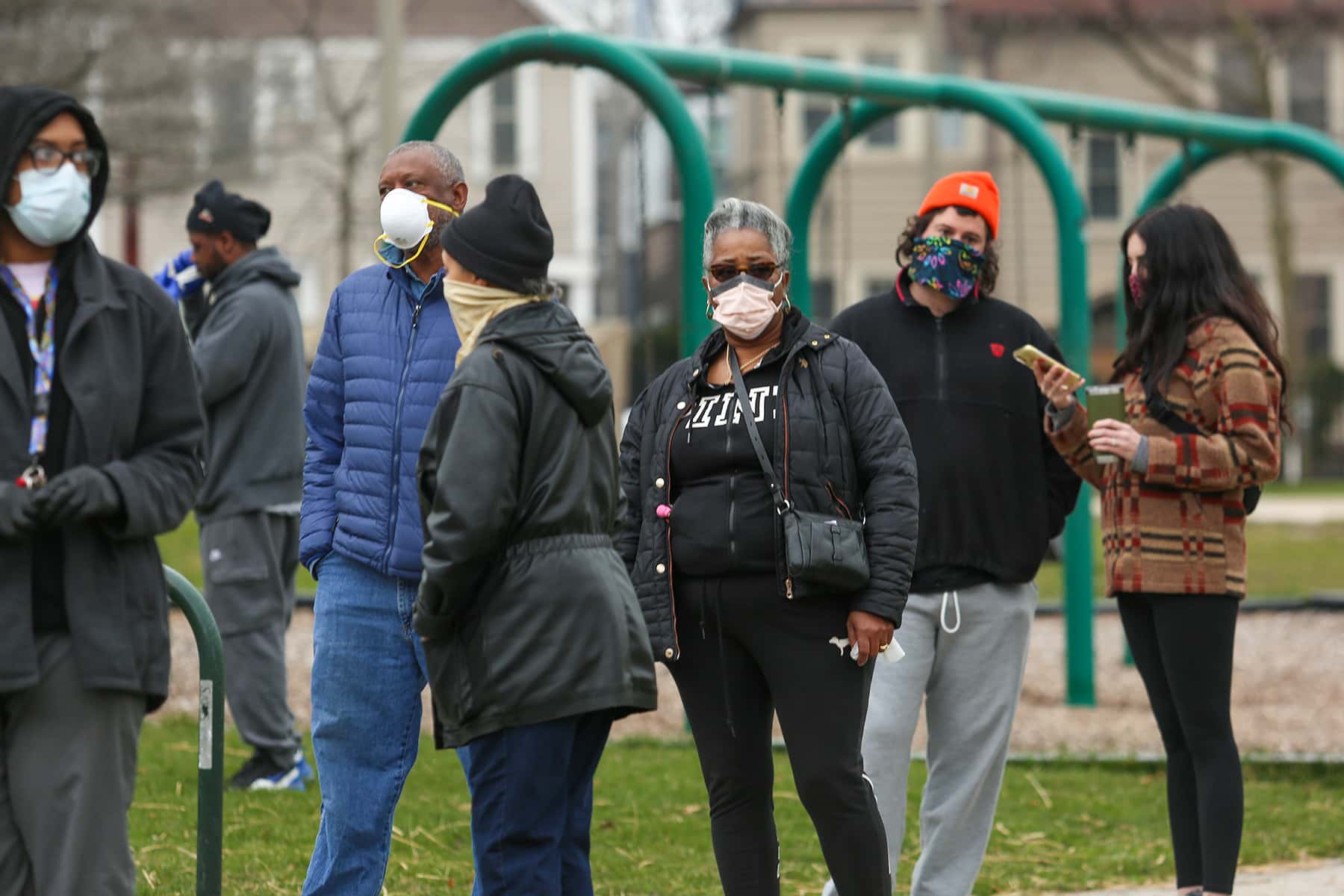
“The right of citizens of the United States to vote shall not be denied or abridged by the United States or by any state on account of race, color, or previous condition of servitude.” – 15th amendment to the U.S. Constitution ratified February 3, 1870
We have heard the common refrain that people died for our right to vote in the black community for decades. We are told constantly to value the sacrifices of those who risked life and limb to gain voting rights for our people. The right to vote was supposed to be the salve for our deep wounds suffered over nearly four hundred years of enslavement and segregation in America.
We just witnessed the manifestly dishonest truth of this argument. Electoral politics has not saved us from racism and mistreatment. Wisconsin held an election during a pandemic, forcing thousands to risk their lives and lives of those they come into contact with over coming weeks in order to vote in our spring primary. In Milwaukee five polling places were open instead of one hundred and eighty that are normally available due to social distancing concerns. Milwaukeeans waited hours in line to cast a ballot a day after the attempt by the governor to postpone the election failed.
It failed because Republican leaders of the Wisconsin Senate and Legislature as well as the State Supreme Court and U.S. Supreme Court refused to listen to public health experts here and around the country warning us to not have an election. I will not waste your time with the dynamics of how this fiasco played out. What I will say is that it is another clear example that Wisconsin may as well be Mississippi.
I often joke when people ask me where I’m from by saying Wississippi. I was born in Mississippi but raised in Wisconsin. On June 9, 1963 in Mississippi a five-foot-four inch tall dynamo by the name of Fanny Lou Hamer was arrested along with other voting rights activist in Winona, Mississippi. They had been traveling from a voter registration workshop for the Southern Christian Leadership (SCLC) Citizenship School in South Carolina by Greyhound bus back home to Greenwood, Mississippi.
Hamer and the others had the audacity to sit in the “white only” section of the bus and the driver threatened to call the police. Just before stopping in Winona the driver made an unscheduled stop and called ahead to the police department. To make matters worse, some of the activists challenged the segregated order by sitting at the “white only” lunch counter once arriving at the bus depot in Winona. The U.S. Supreme Court had previously ruled these segregated rest stops unconstitutional, but throughout the South the ruling was ignored.
Police Chief Thomas Herrod and a highway patrolman arrived on the scene and ordered them to all go to the “colored” side of the bus terminal. One of the activists attempted to write down the license plate number of the Chief’s patrol car leading to the arrest of five of the activists. Hamer was on the bus when the others were arrested and left to defend them. She was then shoved to the ground, kicked, handcuffed and arrested.
Winona was just 30 miles from Greenwood, a hotbed of voting registration activism. The activists had been previously warned by the Montgomery County Sheriff that, “ “you come over here [from Greenwood] to Winona, you’ll get the hell whipped out of you.” While in the jail the police ruthlessly beat several of the activists with blackjacks and a studded leather strap.
They began by beating 15-year-old June Johnson with the leather strap while she was forced onto the floor of the cell she was placed in. By the end of the savage beating her dress was soaked with blood. She screamed and asked God to have mercy on them during the entire episode. The next victim was Annell Ponder of the SCLC. She was beaten with “blackjacks, a belt, fists, and open palms,” as she remembered and recounted later. “They really wanted to make me say yes, sir…and that is the one thing I wouldn’t say.”
The jailers dragged Ms. Hamer from her cell and ordered one of two black men to beat her in their cell. She pleaded with the first man, “You mean you would do this to your own race?” When he became too exhausted to continue the other man was forced at gunpoint to finish the beating. Hamer was nearly killed and overheard one of the police officers say as she regained consciousness, “We could put them SOBs in [the] Big Black [River] and nobody would ever find them.” The wife of the jailer brought Hamer cold water and told her “she tried to live a Christian life.”
Hamer lost vision in one eye and suffered permanent kidney damage as a result of the beating, which contributed to her early death at the age of 59 in 1977. An activist named Willie Peacock from my hometown, made inquiries about the whereabouts of the activist when they did not return on time. After they were finally found, Lawrence Guyot traveled to Winona to post bail for the six but was beaten and arrested also. Four days after the arrest they were finally granted bail and learned of the assassination of the Mississippi NAACP leader Medgar Evers outside his home in Jackson while they were in custody.
In December the U.S. Justice Department filed charges against the law enforcement officers in federal court for seven counts of depriving the activists of their civil rights. No state charges were ever brought for the beatings. As was to be expected in the federal trial in Oxford, Mississippi the home of Ole Miss, one of the attorneys representing the officers said, “You have agitators on one hand, and elected officials on the other, who shall you believe?” In short order, the all-white jury found the sheriff and police chief not guilty on all counts.
“If the white man gives you anything, just remember when he gets ready he will take it right back.” – Fannie Lou Hamer
This is one of many stories of courageous black people who risked their lives to gain the rights, which had been guaranteed by the Fifteenth Amendment to the Constitution nearly one hundred years earlier. Mississippi was not alone in disenfranchising blacks. In 1901 Alabama called a special Constitutional Convention with the express intent of “eliminating the darkey” and “maintaining white supremacy.” In 1890, Mississippi had called a similar convention by openly saying, “It is the manifest intention of this Convention to secure to the State of Mississippi ‘white supremacy.’”
Poll taxes and literacy test became some of the tools to make sure black people could not vote in significant numbers. Felon disenfranchisement laws were passed throughout the country to make sure black men would not be able to vote. State after state passed laws known as Black Codes, which criminalized black behavior. These laws led to black men losing their right to vote when white men could do the same things with no punishment. These ugly vestiges of the Jim Crow era are still alive and well today.
In 2016, according to the Sentencing Project, these laws disenfranchised 6.1 million Americans. One of every forty adults in the country was ineligible to vote in 2016 due to a current or previous felony conviction. One in thirteen blacks were disenfranchised heading into the 2016 election nationwide. In Wisconsin, 22,427, (8.75 percent) of the black voting age population was not able to cast a ballot. The state does not allow those with felony convictions who are out of prison but still under correctional supervision – known as being on paper – to vote. Only Iowa at 9.84 percent, disenfranchises a larger percentage of blacks in our region.
This suppression of the black vote is one of the tools used to intentionally disempower blacks in Wisconsin. Another more recent tool is the passage of strict Voter ID laws. Across the country, eighteen states have Voter ID laws on the books. Wisconsin passed their Voter ID law under former Governor Scott Walker in 2011. The law was challenged in court and in August 2016 an appeals court allowed the law to stand after a federal court ruled it unconstitutional that July. The U.S. Supreme Court refused to chime in on the case.
The Voter ID laws have led to significantly lower number of blacks voting across the country. The national black voter turnout decreased for the first time in twenty years when it fell to 59.6 percent in the 2016 November election. Four years earlier it had reached a record 66.6 percent, higher than the white voter turnout percentage for the first time in American history. The seven-point drop was the largest drop ever registered for blacks. 765,000 less blacks voted in 2016 than 2012. Twenty states have passed restrictive voting laws since 2010. Wisconsin joined such former Confederate states as, Texas, Mississippi, Alabama, South Carolina and Virginia in limiting black voting rights.
According to the Brennan Center, “Nationwide, approximately 11 percent of Americans lack government-issued photo ID, including a disproportionate number of people of color…” In 2004 no such strict Voter ID laws existed and just Georgia and Indiana had strict Voter ID laws in 2008. In 2012 Tennessee and Nebraska were the next states to institute such laws. Alabama, Arizona, Indiana, Kansas, Mississippi, Nebraska, New Hampshire, Ohio, Rhode Island, South Carolina, Tennessee, Texas, Virginia, and Wisconsin all had Voter ID restrictions take effect leading up to the 2016 election. Of the eleven states with the highest black voter turnout in 2008, six placed new Voter ID laws in place.
Just two years after Hamer was savagely beaten in Mississippi, Congress passed and President Lyndon Johnson signed the Voting Rights Act of 1965. It was the culmination of years of advocacy by the black community around the country and resulted in the loss of many lives when the law was finally passed. One of the other pressures that led to passage had been the murder of white voting rights activist Viola Liuzzo outside Selma, Alabama on March 25, 1965. She was the second white person murdered in Alabama while working for voting rights. Just two weeks earlier Rev. James Reeb suffered a brutal beating and died after sustaining severe head injuries.
After watching the brutality of the Bloody Sunday incident where hundreds of civil rights activists were unmercifully beaten on the Edmund Pettis Bridge, Liuzzo decided to go to the South to help. She told her family, ”I’m tired of sitting here watching people get beat up,” before driving off to Selma. She would be dead less than two weeks later.
Liuzzo was ambushed and shot in the head by members of the Ku Klux Klan while giving a ride after a Freedom March from Selma to Montgomery to a 19-year-old black man, Leroy Moton. The story instantly became international news and the following day the FBI arrested four men in connection to the murder, one of which was an undercover FBI informant. The other three were charged with conspiracy to violate her rights and President Johnson angrily referred to the Ku Klux Klan as a, “hooded society of bigots.”
News of the murder of a white woman led to a ramping up of pressure to push through the voting rights bill that had languished in Congress for many months. Bigoted whites from around the country sent hate mail to Liuzzo’s family in Detroit after her murder calling her a “nigger-lover,” drug addict and “communist- agitator.” Crosses were burned in their front yard on multiple occasions. Fifty-five percent of readers of the Ladies Home Journal suggested she had brought death on herself in a survey taken right after her murder.
Liuzzo’s younger sister was taunted and had rocks thrown at her as she attended school. In the months after the murder under the auspices of J. Edgar Hoover, the FBI began a smear campaign of Liuzzo releasing her psychiatric records and suggesting that she was promiscuous. Alabama Gov. George Wallace publicly proclaimed that white women like Liuzzo had come down from the North and would be going back home and giving birth to black babies.
The four Klan members arrested were Eugene Thomas, 43; William Eaton, 41; Collie Leroy Wilkins Jr., 21; and Thomas Rowe Jr., 34. Rowe was later disclosed, to be an FBI informant. An all-white, all-male jury acquitted them of Liuzzo’s murder. They were then charged under federal law with violating her civil rights and sentenced to 10 years in federal prison. Rowe had been granted immunity for testifying against the other three men.
The fact that it took two white murder victims to put pressure on Congress despite the fact that many blacks had also been murdered, was not lost on the black community. The Voting Rights Act of 1965 was designed to ensure state and local governments cannot pass laws or voting policies that will deny American citizens the equal right to vote based on race. Section 5 of the Voting Rights Act required certain jurisdictions including several of the former Confederate states with a history of discrimination to submit any proposed changes in voting procedures to the U.S. Attorney General’s office for approval. This policy is known as preclearance.
In April 2010, Shelby County, Alabama filed suit asking a federal court to declare Section 5 of the Voting Rights Act unconstitutional. According to the Brennan Center, “In September 2011, the U.S. District Court for the District of Columbia upheld the constitutionality of Section 5 of the Voting Rights Act, and in May 2012, the U.S. Court of Appeals for the District of Columbia Circuit agreed with the district court that Section 5 was constitutional. Shelby County appealed the ruling to the Supreme Court, and the Supreme Court agreed to take the case in November 2012.”
The U.S. Supreme Court ruled in Shelby County v. Holder that the coverage formula determining which jurisdictions Section 5 applied to was unconstitutional in a 5-4 decision. The majority led by Justice Roberts argued that the past vestiges of racism in those jurisdictions no longer existed and they should no longer be held to the standards of their Jim Crow past. Justice Ruth Bader Ginsburg wrote the dissenting opinion that Justices Breyer, Sotomayor and Kagan joined.
“After exhaustive evidence-gathering and deliberative process, Congress reauthorized the VRA, including the coverage provision, with overwhelming bipartisan support. It was the judgment of Congress that “40 years has not been a sufficient amount of time to eliminate the vestiges of discrimination following nearly 100 years of disregard for the dictates of the 15th amendment and to ensure that the right of all citizens to vote is protected as guaranteed by the Constitution.” 2006 Reauthorization §2(b)(7), 120 Stat. 577. That determination of the body empowered to enforce the Civil War Amendments “by appropriate legislation” merits this Court’s utmost respect. In my judgment, the Court errs egregiously by overriding Congress’ decision.”
This decision led Southern states and localities to pass policies and laws immediately afterwards which overturned the power of the Voting Rights Act. Many of these have included Voter ID laws. The decision to not protect the voters of Wisconsin amid a pandemic is a direct result of these types of policies.
Republican lawmakers, including Wisconsin Speaker Robin Vos, assured voters that it is “incredibly safe to go out” on Election Day despite the COVID-19 pandemic. These same lawmakers had defeated attempts by Democratic Governor Tony Evers to postpone the election due to concerns about the spread of the Coronavirus. A majority conservative leaning Wisconsin Supreme Court ruled that Governor Evers did not have the right to postpone the election despite such fears.
Likewise the U.S. Supreme Court overturned a decision by a federal judge which had given the state the right to count all absentee ballots received as late as 4p.m. on April 13 regardless of when they had been postmarked. Vos falsely claimed on Election Day that voters whose absentee ballots have not arrived yet could get a ballot emailed to them.
As I listened to my daughter talk about the orderly progression of voting at her polling place in Waukesha on Election Day where they were handed masks, gloves and even pens as well as having orange cones to direct people to keep their distance of six feet from one another it contrasted with what was going on in the five polling places in Milwaukee.
National and local news organizations showed images of massive numbers of people throughout Milwaukee at polling places like Washington High School, Riverside High School and Marshall High School waiting in line for several hours to vote. Some practiced social distancing and others did not on a very warm April day where temperature reached the seventies.
Some wore masks and others either did not have them or chose to not wear them. Thousands stayed home to protect themselves and untold numbers in the black community in particular were not able to get absentee ballots in time or at all because you either had to do it online or show up to a place to pick it up in person. There have been reports that many absentee ballots have been returned without witness signatures and will not be counted.
As the COVID-19 illness ravages Milwaukee, the black community represents over 70 percent of the COVID-19 deaths in Milwaukee County. I believe it should be a crime to force people to pack into polling places while a strict “Stay-At-Home” order is in place to protect residents of the state from the spread of the virus.
Milwaukee Mayor Tom Barrett complained, “This should never had occurred in the fashion it is occurring. It’s almost embarrassing that we have for weeks now been saying stay at home, stay at home, stay at home.”
His opponent, State Senator Lena Taylor, who unsuccessfully sued to postpone the election, was incensed that the election was not postponed and that just five polling place were open in the city. “Five sites? I would never have done that as mayor,” Taylor said. “Five sites? Out of 180?”
Once again racism has kept the black community in Milwaukee in a place where our lives are not valued. We are the most vulnerable victims to this pandemic that is ravaging our community’s elders. They are the most likely demographic to vote in large numbers. Far too many have already been killed by the virus. I fear that those who risked contracting the virus by being out to vote will unwittingly spread the virus to their loved ones and other community members.
Several other states pushed back their primary elections due to the pandemic, but Republicans in Wisconsin prevented the same from occurring. The black community will remember this for many years moving forward. We already feel like second-class citizens at best, and this Election Day fiasco proves that our health and well-being is not valued by some in the state. Lives will undoubtedly be lost as a result of this failure to postpone the election.
Who will take responsibility and admit their role in this disgraceful day in Wisconsin? No one should have ever been required to risk their lives to gain the right to vote in this country but black people had no other choice. Likewise, no one should have been required to risk their lives to vote in Wisconsin on Election Day but many did.
“By depriving us of suffrage, you affirm our incapacity to form an intelligent judgment respecting public men and public measures; you declare before the world that we are unfit to exercise the elective franchise, and by this means lead us to undervalue ourselves, to put a low estimate upon ourselves, and to feel that we have no possibilities like other men.” – Frederick Douglass, What the Black Man Wants, April 1865
© Photo
Claudio Martinez and Lee Matz

